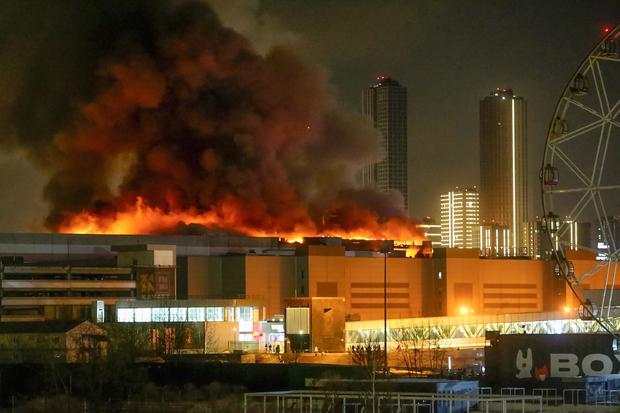What we know about the Moscow concert hall attack claimed by ISIS in Russia
It was Friday evening in Moscow when gunmen burst into Crocus City Hall, an entertainment complex on the outskirts of Russia's capital, where a rock concert by the group Picnic was about to take place. Video showed at least four people opening fire in the building's foyer before entering the hall itself and continuing to shoot.
Russian authorities said the attackers then set fire to the hall using flammable liquid. Despite helicopters dropping water over the building, it took 10 hours to extinguish the flames.
The March 22 attack lasted about 20 minutes, and in that time, at least 137 people were killed and at least 60 others critically wounded, CBS News partner network BBC News reported. Here's what we know:
Who carried out the Moscow attack?
The Islamic State of Iraq and Syria, ISIS, released a statement on Friday claiming responsibility for the attack. The terrorist group issued another statement the following day that cast the raid as part of ISIS' ongoing war on countries it claims are fighting against Islam.
In a first for ISIS, the statement released by the group's media propaganda operation attributed the attack to its Russia branch, which it had never identified as such. Previous attacks had been attributed to ISIS in the Caucasus, referring to a broader region that encompasses part of southern Russia, but also some other nations such as Armenia, Azerbaijan and Georgia.

A U.S. intelligence official told CBS News that American agencies had intelligence confirming ISIS was responsible, and said the U.S. had no reason to doubt the claims made by the group.
About 14 hours after reports of shooting began, Russia's Federal Security Service said 11 suspects had been arrested, four of whom it accused of being directly involved in the attack.
On March 24, four suspects between the ages of 19 and 32 — identified as Dalerdzhon Mirzoyev, Saidakrami Murodali Rachabalizoda, Shamsidin Fariduni and Muhammadsobir Fayzov — appeared in a Russian court showing signs of severe beatings. They were charged with acts of terrorism. Russia's state news agency said the four men were from Tajikistan.
There has been suspicion, despite the group's own claim that a domestic Russian branch of ISIS carried out the attack, that its Afghanistan division, ISIS-Khorasan or ISIS-K, was behind the carnage. That suspicion came largely due to warnings issued by the U.S. in the weeks ahead of the attack, and Russian officials claiming to have thwarted other operations planned by ISIS-K in Russia even more recently.
U.S. officials have not said which branch of ISIS they believe carried out the attack, but they have strongly refuted claims from Russian President Vladimir Putin that there may have been some involvement by Ukraine, a neighboring country that Russia invaded more than two years ago, sparking a full-scale, ongoing war.
Ukraine has also denied any involvement in the attack.
In addition to the previously unheard of Russia branch being named as the perpetrators, the Moscow attack also appeared to deviate from most ISIS assaults in that the terrorists fled the scene. Most violent attacks carried out by the group see their operatives fight arriving law enforcement personnel to the death, rather than being captured or fleeing.
What did the U.S. warn about in Russia?
The assault in Moscow came two weeks after the U.S. warned of a potential attack targeting large gatherings in the Russian capital. The U.S. Embassy in Moscow had publicly advised Americans to stay away from events, including concert venues, because of the potential for a terrorist attack.
The U.S. provided intelligence to Russia regarding the potential for an attack under the American intelligence community's "Duty to Warn" requirement.
"In early March, the U.S. government shared information with Russia about a planned terrorist attack in Moscow," National Security Council spokesperson Adrienne Watson said in a statement. "We also issued a public advisory to Americans in Russia on March 7. ISIS bears sole responsibility for this attack. There was no Ukrainian involvement whatsoever."
Last week, Putin dismissed the warnings, saying "recent provocative statements by a number of official Western structures about the possibility of terrorist attacks in Russia... resembles outright blackmail and an intention to intimidate and destabilize our society."
"ISIS bears sole responsibility for this attack," U.S. National Security Council spokeswoman Adrienne Watson said in a statement. "There was no Ukrainian involvement whatsoever."
CBS News' Khaled Wassef and Tucker Reals contributed to this report.
- In:
- ISIS
- Terrorism
- Russia
- ISIS-K
- Moscow

Haley Ott is the CBS News Digital international reporter, based in the CBS News London bureau.
Twitter InstagramDisclaimer: The copyright of this article belongs to the original author. Reposting this article is solely for the purpose of information dissemination and does not constitute any investment advice. If there is any infringement, please contact us immediately. We will make corrections or deletions as necessary. Thank you.
Title:What we know about the Moscow concert hall attack claimed by ISIS in Russia
Url:https://www.investsfocus.com







